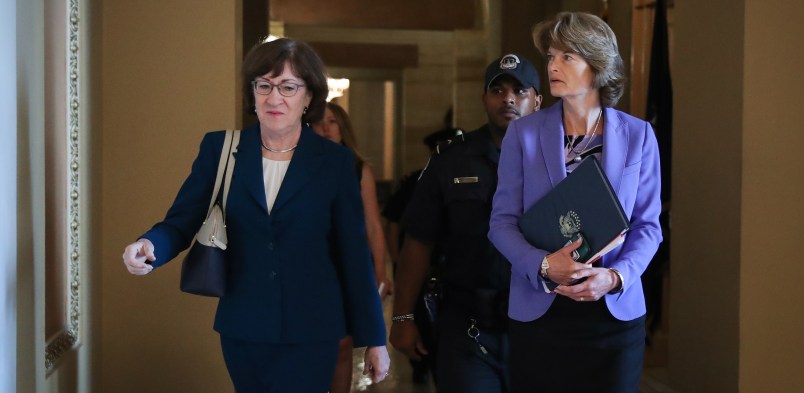The House will likely vote Tuesday to overturn President Trump’s emergency declaration. Then things get interesting.
Senate Democrats are expected to introduce a near-identical resolution sometime this week, starting a legally mandated countdown that will likely force a Senate vote on the emergency declaration. This could mark the first time a significant number of Senate Republicans rebuke President Trump since he won office.
Yet, there are two big questions hanging over the vote, the first of its kind in history. The biggest is how many Republicans break with their president over his efforts to seize money that Congress appropriated for other purposes to build his border wall along the southern border, a move many GOP lawmakers sharply criticized. There’s also a huge procedural asterisk about this whole discussion. The law, simply, has never been tested. That could lead to some novel maneuvers by both sides, and to some potentially unexpected results depending on how the Senate parliamentarian views the law.
The measure would only needs 51 votes to pass the Senate, as it is not subject to the filibuster. If Democrats all support it, as expected, only four Republicans would need to split off to pass it and force Trump to issue his first veto. Sen. Lisa Murkowski (R-AK) said she plans to vote for the resolution of disapproval of Trump’s border wall declaration over the weekend, joining Sen. Susan Collins (R-ME), who said earlier she’d likely vote with Democrats on the measure. That means Democrats likely need just two more defectors to pass the measure.
The process itself is a bit of an open question. By law, once the measure is introduced in the Senate, it will be sent to committee, where it must receive a vote within 15 calendar days. Whether it passes in committee or not, it will be reported out of committee and must get a vote on the Senate floor three days after that.
The measure can be amended, giving Senate Majority Leader Mitch McConnell (R-KY) some room to maneuver to try to kill it. But it’s unclear how much it can be amended and what poison pills can be added. It appears that McConnell would be blocked from adding a provision for border wall money to the resolution of disapproval, for instance. And while McConnell has flipped to support Trump’s move, it’s unclear at this point how hard he’s willing to work to block a vote on a bill many of his own members want to vote on.
This all means that the Senate is likely to vote on the bill sometime in mid-March, and that it stands a good chance of passage — though it’ll likely fall far short of the 67-vote threshold needed to overcome a Trump veto.
With Murkowski and Collins on board, there are more than a dozen other Republicans to watch who expressed some level of unhappiness with Trump’s emergency declaration. Many either face tough reelection battles in swing states, like Collins, are retiring, like Sen. Lamar Alexander (R-TN), or have shown a willingness to buck Trump on other issues, like Sen. Mitt Romney (R-UT).
Among this broader group are four who expressed clear opposition when Trump made the announcement: Alexander and Sens. Thom Tillis (R-NC), Rand Paul (R-KY) and Mike Lee (R-UT).
All four have less reason to stay with Trump than many in their party. Paul and Lee regularly break with their party on issues they see as fundamentally unconstitutional or a violation of the separation of powers. Alexander, a pragmatic lawmaker who already bucked Trump to vote with Democrats last month to reopen the government without border funding, is retiring. Tillis is facing a potentially tough reelection in a swing state.
Sen. Cory Gardner (R-CO) also expressed reservations about Trump’s border wall move, voted with Democrats to reopen the government last month without giving Trump his wall money, and faces a tough reelection fight.
Sen. Johnny Isakson (R-GA) voted to reopen the government without giving Trump his border money, criticized Trump’s move, and is viewed as a retirement possibility in 2022, though he’s said he’ll run. Sen. Marco Rubio (R-FL) sharply criticized Trump’s move, and while he’s been more willing to criticize Trump than to vote against him, on national security issues he’s shown more spine than on other topics.
Sen. John Cornyn (R-TX) also has been skeptical of Trump’s wall, criticized the president’s emergency declaration, and could face a tough 2020 race in a state where border politics are much more nuanced and complicated than they are nationally. Sen. Martha McSally (R-AZ) has remained pointedly quiet about the issue and so far has been unwilling to criticize Trump at all, but faces a tough reelection fight in a purple-trending border state.
Sen. Pat Toomey (R-PA) bashed Trump’s move as well, and doesn’t face reelection until 2022 in a swing state. Sen. Ben Sasse (R-NE) also criticized Trump’s move, though a 2020 primary threat might make him wary of voting against Trump.
There’s a ton of uncertainty around how this plays out. But right now, it looks like there is a real chance that enough Senate Republicans forcefully reject Trump’s attempted border money grab to seriously embarrass him and heighten divisions within the party.






